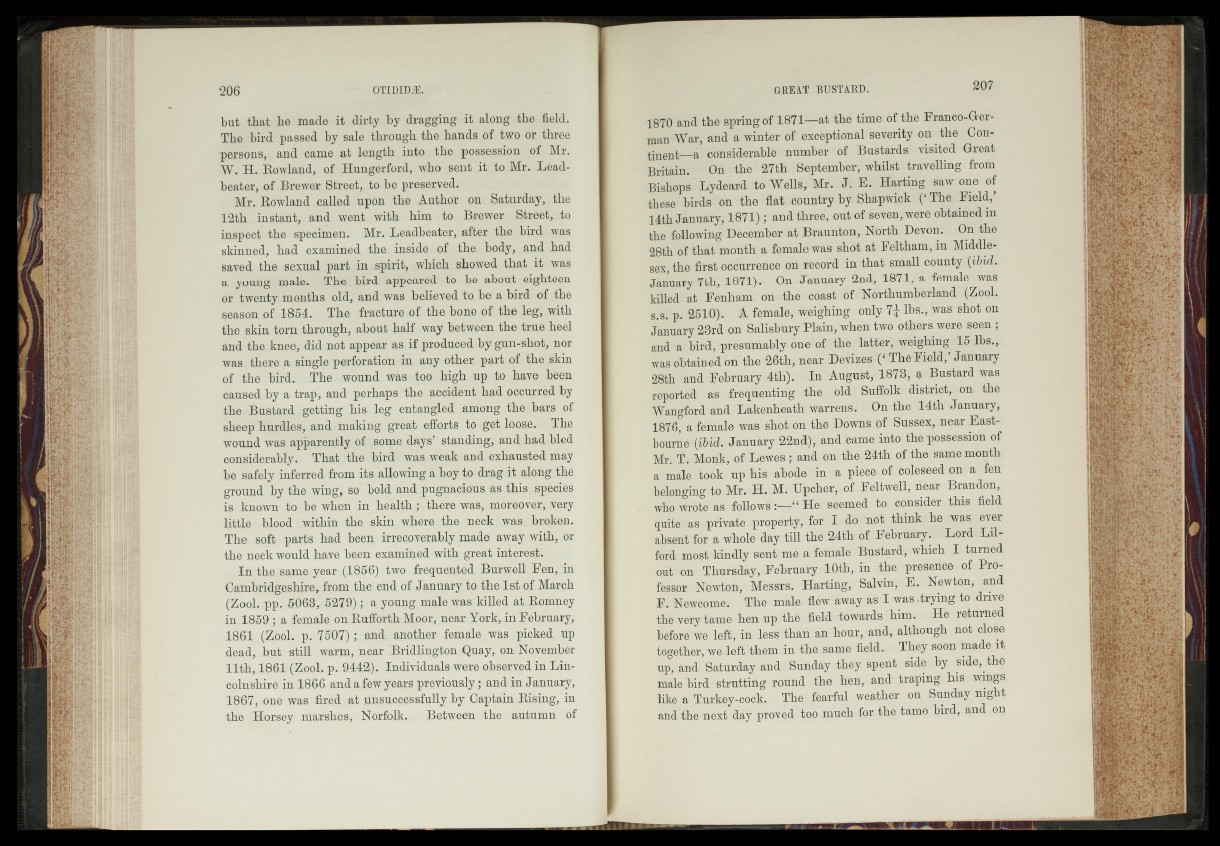
but that he made it dirty by dragging it along the field.
The bird passed by sale through the hands of two or three
persons, and came at length into, the possession of Mr.
W. H. Rowland, of Hungerford, who sent, it . to Mr. Lead-
beater, of Brewer Street, to be preserved. .
Mr. Rowland called upon the Author on Saturday,pthe
12th instant, and went with him to Brewer Street, to
inspect the specimen. Mr. Leadbeater, after the bird was
skinned, had examined the inside of the; body, and had
saved the sexual part in spirit, which showed that 4V3was
a young male. The bird appeared to be about eighteen
or twenty months old, and was believed to, he a bird of the
season of 1854. The fracture of the bone of the leg, with
the skin torn through, about half way between-the true heel
and the knee, did .not appear as if produced bygUUkshe%*Jior
was there a single perforation in any other part ,of,?thè ,skin
of the bird. The wound was too high up fo-have been
caused by a trap, and perhaps the jaççidènt had occurred- by
the -Bustard getting his leg entangled among the .fears M
sheep hurdles, and-making,great efforts t,p*;gfet loose^.H^e
wound was apparently ofi^so,rpe days’ standing, and had bled
considerably. That [the bird was weak and /exhausted- may
be safely, inferred from .its:airo.vlhg a,feey to drag it alongiffee
ground by the wing, so- bold and pugnacious-as this/gpejies
is known to be when in health j^iStere was, moreOver/lèry.
little ' felood - within the skin where, tfee.meek'was,'broken.
The soft parts had -been, irrecoverably-made away with, .or
the neck would have, been examined with great interest. .
In the.same years(4üâ);éWQj-frequepte.d Burwell Fen,'in
Cambridgeshire, from the end;^ January to the 1st [of-,March
(Zool. pp. 5Q63:, .527%*: a young male wasikilled.-^Romney
in/1859 ; a female: on RuffôrJli;-M0pr:, ^ a r ïork', in Ffefeæoary,
1361 (Zoolr.p. 7507) ; and-iapether female;.was. .piq-kedLup
dead, but' still warm, near Bridlington ,Quay, on:NaV#m,feër
11th, I 8 6 I 4Z00L -p. 9442);. Individuals were observed in Lincolnshire
ih4866 and a few yearsj)reyipuslyand in January,
18.67, one was fired at Unsuccessfully-,fey Qaptain.Rising, in
the -, Horsey marshes,. Norfolk. Between-, the autumn of
1870 and the spring of 1871—at the time of the Franco-German
War, and a winter of exceptional severity ón - the . Com
tinent—a • considerable number of Bustards? visited Great
Britain. . On the 27th I September, whilst- travelling from
Bishops Lydeard to Wells; Mr. J: E. Halting saw’one of
these birds on the flat country by Shapwick (‘The Field,’
14th January,‘1871); and three, o u t of-seven, were obtained in
the following December at Braunton,:North Devon; On the
28th of that month a female was shot at Feltham, in Middle-^
sex, the first occurrence on recordlan.that small cóunty/(iZm$b
January 7tH, 1871); On January 2nd,' 1871, a 'female was
killed at Fenham on the coast of*-'Northumberland (ZhoM.
s.Si p. 2510). A female* weighing only ?£ lbs;, was shot on
January 23rd on Salisbury.Plain, when two others were seen ;
and a, bird, presumably! one of the latter, weighing 15 lbs.,
was obtained on the'26th, near Devizes (‘^The Field*’ January
28th '.and -February 4th); In August, 1873, $ Bustard was
reported as- frequenting-, the old Suffolk;-district/, on the
Wangford and Lakenhéath. w&rrens. On-the 14thr?January*
1876, a female, was;- shot, on -the -powns.bff-Sussex,? near Eastbourne
ipiifc January 22nd),-and came into the possessibh of
Mr' tl*Monk, of Lewes; and. om the 24th of the same month
a male - toók up -his. abode in a piece of coleseed-on a fen
beiefeging-jfc®; Mr. H..MaUpcher,öf Fèltwell, near Brandon,
whowrSte' as follows:—“ He seemed-to, consider this field
quitePas. private property,-fob.L do- pot. think -he.was . ever
absent for a whole daytühttfó 24th'èf-?February.' ‘Lord *
ford most kindly sent-me & female, Bustard, which I turned
out-ion' Thufsday, February -10th, in the. presefie'e of Professor
Newton, Messrs. Harting/ SalvinpR. Newton, and
F. Newcome: The -male -flewiaway as I was -trying to drive
the very tame?ken up4l%field towards him. He returned
before we left, in- less than j an Lour,/and,- although not dose
together.,' we feiPtbem.imthtósame field. They-soon-inade it
up* and Saturday and Sunday-tb# spept. side Ry.^idó, thé
male bird struttingrround the; hén, and; tr aping his wings
like a Turkey:coc^ s j k p fegrful we^th.er on Sunday night
and"the-next day proved too much fo£'|he tame bird, and on